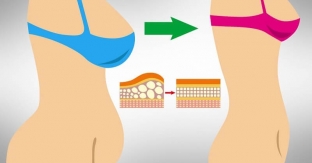Overweight for many women is not the result of excessive calorie intake or low levels of physical activity. The main problem for them is the disruption of certain hormones. Research on hormonal problems associated with weight gain is still ongoing, but Dr. Sara Gottfried, based on the results achieved by her patients, is convinced that it is the normalization of the so-called weight gain hormones that should be paid attention to unsuccessfully trying to lose weight. .
Which hormones to look out for when gaining weight
Dr. Sarah Gottfried – the author of several best-selling books (The Hormone Cure and The Hormone Reset Diet) on hormonal health, she is convinced that every woman who is faced with the problem of excess weight needs to know which hormones contribute to the addition of extra centimeters at the waist and how to balance them to become not only more beautiful, but also healthier.
The hormones that promote weight gain, in addition to thyroid hormones and insulin, include:
- leptin;
- cortisol;
- estrogens;
- testosterone.
The hormone leptin and weight gain: when appetite gets out of control
Dr. Gottfried introduces leptin as a hormone that tells us to put down the fork and stop eating. Under normal conditions, leptin is synthesized by fat cells and travels through the bloodstream to the brain, where it gives the order to stop eating.
However, what prevents leptin from reaching its good goals is our consumption of a certain type of sugar – fructose, which is found in fruits and processed foods. Small amounts of fructose do not interfere with the hormones of weight gain and weight loss. However, eating more than 5 recommended servings of fruit per day + foods that contain additives of this type of sugar results in the liver not being able to deal with this amount of fructose fast enough to use it for energy.
Instead, the body begins to convert fructose into fat, sending it into the bloodstream as triglycerides and storing it in the liver and other parts of the body, such as the abdomen.
Excess dietary glucose can lead to leptin resistance, which in turn leads to increased appetite and weight gain.
The more fructose is converted to fat and stored for later use, the higher the level of leptin becomes (because it is synthesized by fat cells). Accordingly, the more leptin circulates in the body, the less sensitive it becomes to this hormone. This means that the brain begins to ignore the satiety signal, and you continue to eat and gain weight.

Excess of the hormone cortisol: if the cause of weight gain – chronic stress
The stress hormone cortisol can be an obstacle to weight loss. With an increase in the level of this hormone, the process of converting blood sugar into fat for long-term storage starts. This mechanism was a very important adaptation tool for our ancestors, who often faced the problem of food shortage. However, in our time, getting food is much easier, because this mechanism has lost its relevance and, moreover, has become the cause of the appearance of extra centimeters.
Obviously, this hormone of weight gain can be neutralized by reducing the level and frequency of stress in everyday life.
However, there is one more nuance: to survive the already stressful everyday life, we reach for a cup of coffee, which further increases the level of cortisol, making it difficult to lose weight. That is why it is important not to abuse this invigorating drink, especially if your lifestyle cannot be called stress-free.
Estrogen hormones: weight gain as a result of the expansion of adipose tissue
Despite the fact that it is estrogens that make a woman a woman, this group of sex hormones can be a problem. Normal estrogen levels help keep you lean by suppressing insulin production. However, when these hormones get out of control, weight gain becomes almost inevitable. And here's why.
When you eat, your blood sugar levels rise. Protecting the body, insulin reduces it by transferring glucose to three different locations in the body – a small amount of it goes to the liver, a large amount – into muscles for use as fuel, and the rest – into body fat.
Under normal conditions, the pancreas produces the amount of insulin needed to control blood glucose levels. However, as estrogen levels increase, insulin-producing cells begin to work in an enhanced mode, which over time can lead to resistance of the body to this hormone. At the same time, insulin sends a smaller amount of glucose to the liver and muscles, and the lion's share of it goes to storage as fat. Adipose tissue can expand 4 times to accommodate this amount of glucose.
Abnormal increase in estrogen levels can cause insulin resistance.
Why do estrogen levels rise? One of the main causes of this problem is the consumption of large amounts of meat and the lack of fiber in the diet. Moreover, when buying meat, you cannot be sure that steroids, antibiotics and other harmful substances were not used to raise animals. In this way, estrogens can also enter the body, which leads to an increase in their level.

Testosterone suppression and weight gain: what does a slow metabolism lead to
Every day the human body is faced with a huge amount of toxins that enter it from the air, food, cosmetics, etc. Many of these substances, such as plastic, pesticides, industrial chemicals, act like estrogens in the body. Xenoestrogens have been linked to an increased risk of developing diseases such as breast, ovarian, and endometriosis.
All these pseudoestrogens lead to a decrease in testosterone in the body, which in women is also an important part of the hormonal balance and promotes muscle growth, which is the main metabolically active tissue. Moreover, estrogen dominance leads to insulin resistance. Because toxins can affect weight gain more than you think.
On estet-portal.com you can read the article "The Ideal Formula: How to Restore Hormone Balance", which describes the main signs of hormonal imbalance and natural ways to normalize hormonal levels.
Remember that hormones that affect weight gain are closely interrelated, so the imbalance of them can adversely affect your figure. Proper nutrition, active lifestyle and healthy rest – available to everyone ways to normalize hormonal levels. However, do not forget that only a specialist will be able to establish the exact cause of weight gain after carrying out the necessary diagnostic measures.






Add a comment